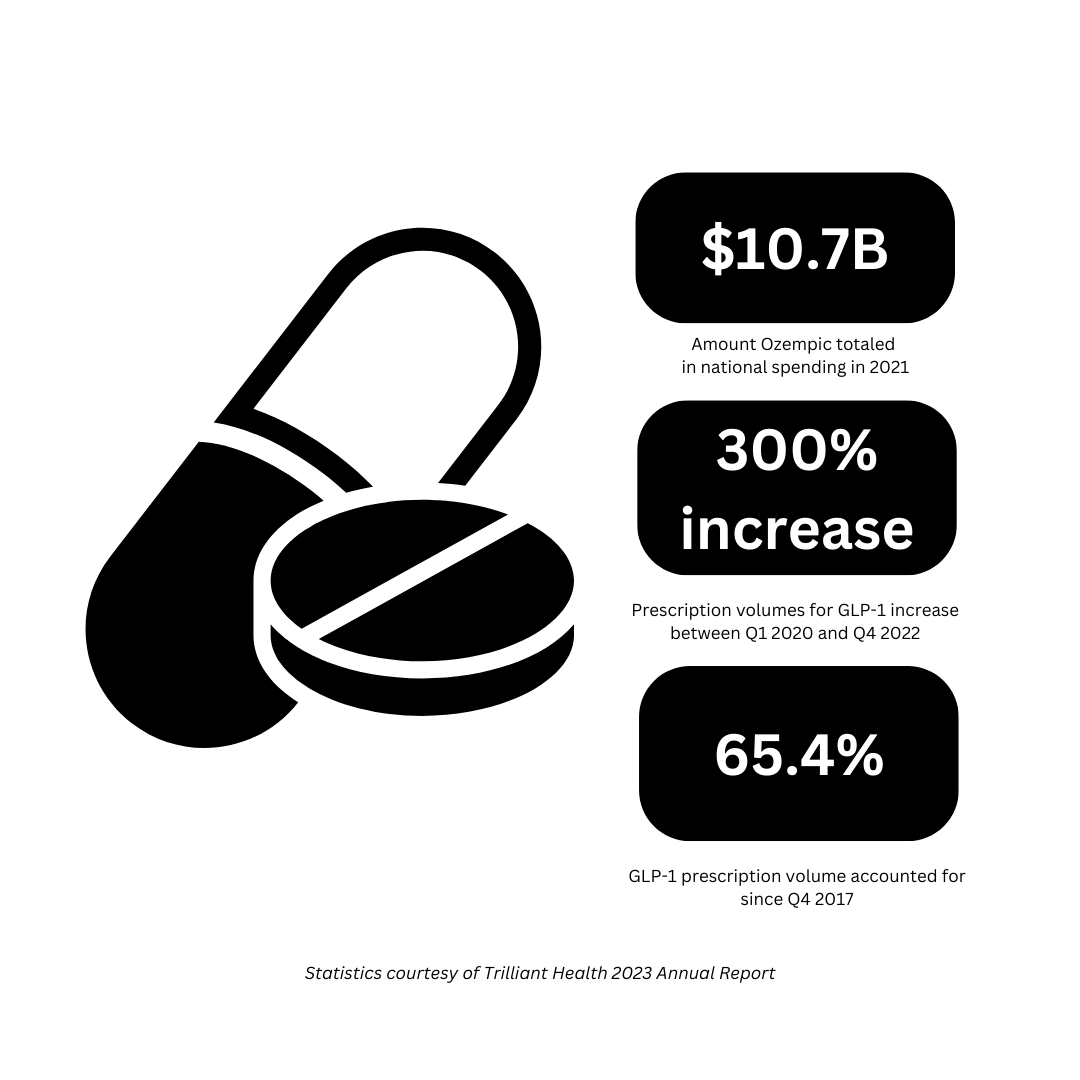Ozempic, an injectable drug that slows digestion and suppresses appetite, has dominated the diabetes drug market since it was approved by the Food and Drug Administration (FDA) in October 2017. In 2023, Ozempic commanded the spotlight for its use to lose weight after numerous celebrities claimed they were using it for aesthetic weight loss — the FDA has yet to approve the drug for this purpose.
Known generically as semaglutide, Ozempic is marketed as an injectable drug to treat adults with type two diabetes. The drug is a weekly injection that lowers blood sugar by helping the pancreas produce more insulin. This imitates the production of the GLP-1 hormone, which causes the movement of food to slow down as it passes through the stomach — this signals to the brain that the body is full, which results in a decreased appetite.
According to Ozempic’s official website, the use of the drug is recommended “along with diet and exercise to improve blood sugar (glucose).”
Trilliant Health, an analytics firm, released a 2023 report which showed that there has been a sharp rise in the demand for GLP-1s and similar functioning drugs to cause weight loss. According to the report, national spending on semaglutide exceeded $10.7 billion in 2021, the fourth highest across drug classes. Prescription volumes for GLP-1 medications have increased by 300% between the beginning of 2020 to the end of 2022.
Among the celebrities who have reported using Ozempic or other GLP-1 medications include Elon Musk, Chelsea Handler and Remi Bader, according to Buzzfeed News.
Cara Gilbert, Fordham College at Lincoln Center (FCLC) ’24, who is prescribed oral drugs with similar functions as Ozempic, expressed concern with the impact of the newfound celebrity status that diabetes drugs have gained because of the cosmetic desire to lose weight.
“I believe that celebrities glamorizing the use of weight loss drugs, specifically, ones that can and should be used for disorders, such as diabetes, is a problem because those medicines are already difficult to get for people who actually need them,” she said.
Gilbert shared that she is currently prescribed metformin and topiramate to treat polycystic ovary syndrome (PCOS), a condition that causes prediabetic symptoms. She noted that she could have been prescribed Ozempic, but added that her physician chose not to prescribe the drug due to its extreme side effects — thyroid tumors, pancreatitis, kidney failure and cancer.
“I lied on the form and I exaggerated how much weight I had and my height. I just clicked whatever I thought was gonna get me the prescription.”anonymous student
An anonymous student, who chose not to disclose their identity in fear of social and familial backlash, shared that they are currently prescribed Ozempic through an online medical prescription website. They noted that obtaining the drug is not difficult and added that they were able to mislead physicians on an undisclosed site that offers prescription drugs virtually, in order to access the drug by falsely filling out a medical questionnaire.
“I lied on the form and I exaggerated how much weight I had and my height,” the student said.“I just clicked whatever I thought was gonna get me the prescription.”
The student was able to get injections of Ozempic shipped to them directly after a healthcare provider approved the prescription. The student claimed to have taken the medication for three months, stating that most of the weight loss occurred in the first month.
Another drug prescription website, Ro.co, advertises Ozempic as a “revolutionary medication” that targets weight loss and helps patients “feel fuller, faster.” Although the site specifies that the drug is not approved by the FDA, it states that it can be prescribed for weight loss should the provider “deems it appropriate.”
According to another drug prescription website, futurhealth.com, approval for the medication can take as little as a five-min quiz.
The popularity of Ozempic has allegedly led to parties that encourage the use of Ozempic as a part of the night’s festivities. According to a flier used to advertise a party hosted on Dec. 16, 2023 in the Lower East Side, 0.5 mg injections of the drug were promoted to event goers.
New weight loss drugs are pending approval from the FDA. Novo Nordisk, the company behind Ozempic and Wegovy — a weight loss drug approved by the FDA which works by using a higher dose of the active ingredient semaglutide in Ozempic — is working on releasing a new weight loss supplement in the form of a pill. The new supplement beat Wegovy’s weight loss results in a recent trial.
Alexa Villatoro contributed additional reporting to this story.


